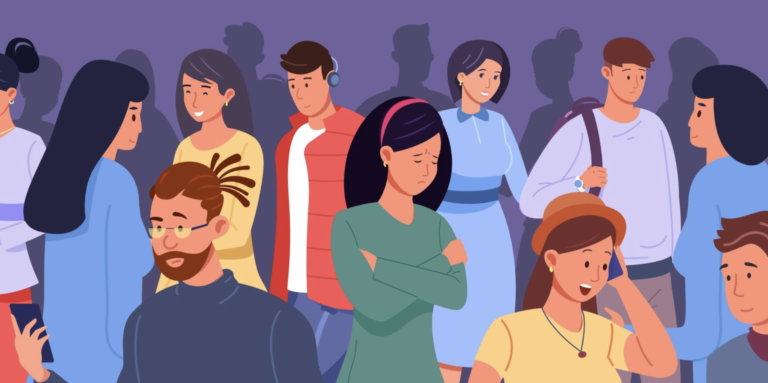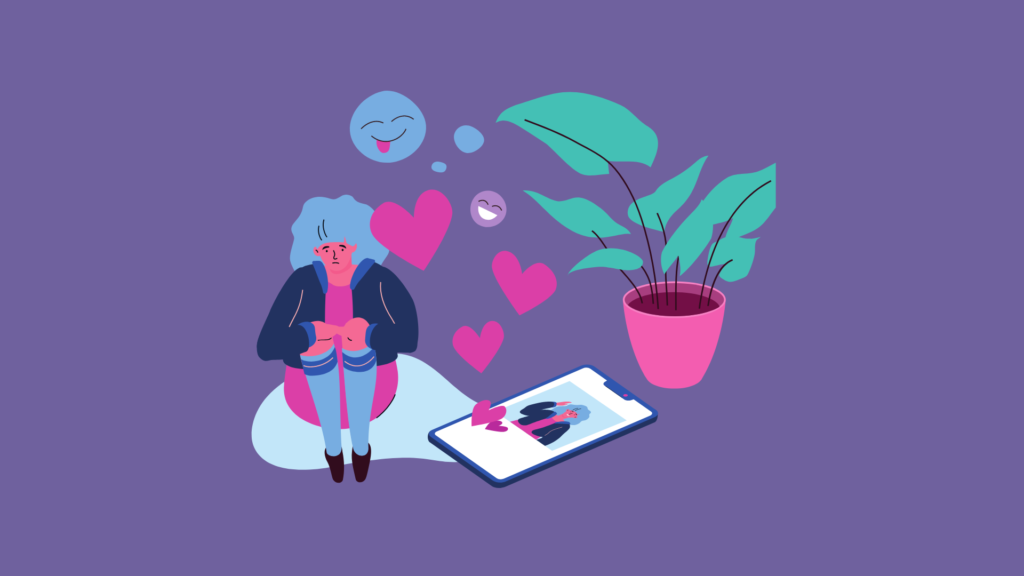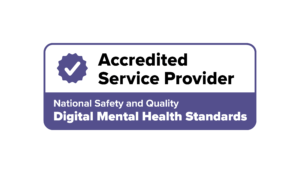The Relationship between Social Anxiety and Loneliness

Written by Katie Dobinson, clinical psychologist at THIS WAY UP
Staying connected and feeling a sense of belonging are essential for your health and happiness. Yet, according to a report by Lived Experience Australia (LEA), feelings of loneliness are commonly experienced by people in Australia*.
“Loneliness is hard and hidden, yet common. It’s a social problem, not an individual one of being alone.”
Loneliness refers to a distressing feeling that arises when there’s a mismatch between the social connections you would like to have and those you feel you have. In this way, feeling lonely is an indication that you might not be satisfied with the current connections in your life – perhaps you’re missing people, or need to build different types of connections. Whilst it’s normal to feel lonely from time to time, prolonged loneliness can have a negative impact on our health, both physically and emotionally. Feelings of loneliness can also make us more vulnerable to worrying about our relationships, and can increase anxious thoughts and feelings about others judging us in a negative way.
The less we talk to and interact with others, the more ‘in your own head’ we can get about social catch-ups. Fear and anxiety can start to build, with thoughts like “What if I say the wrong thing?”, “I will feel awkward”, and “They’ll think I’m boring” being commonly reported by people experiencing loneliness. These types of anxious, self-critical thoughts are also very common for people suffering from social anxiety.
Re: connections
Social anxiety and loneliness frequently go hand-in-hand. If a person feels lonely, it can be very hard to reach out to others for connection, or you may not know who to reach out to. This can lead to reduced socialising, and more time to ruminate and worry about how you might feel when interacting with other people. Similarly, if you are already experiencing fears about how others might perceive you in day-to-day interactions, you might try to cope by avoiding social catch-ups. Overtime this can contribute to feeling lonely and isolated. Whether you notice loneliness or social anxiety first, the two tend to work together forming a vicious cycle of fear and isolation.
Remember that we all experience a bit of anxiety about how we’re perceived by others from time to time, particularly in situations where we’re being evaluated. For example, during job interviews or public speaking. However, social anxiety differs in that the feelings of anxiety are more pervasive and may also occur in everyday situations, such as meeting people, during conversations, or making phone calls. People with social anxiety worry excessively about being negatively evaluated, drawing attention to themselves, being embarrassed or rejected by others.

Common signs and symptoms of social anxiety can include:
- Blushing, sweating, shaking during social interactions (or in anticipation of them).
- Repetitive worries about how others may judge our conversation skills .
- Avoidance of social situations.
Finding ways to reconnect
Social anxiety contributes too often to feelings of sadness and loneliness, and makes it difficult for people to feel comfortable in their relationships. If you are feeling this way, here are some helpful actions you can take to break out of the vicious cycle between social anxiety and loneliness:
- Plan enjoyable activities – whether it’s solo or with someone else, schedule in a fun or interesting activity a few times a week. This might be going to your favourite café, seeing a movie, or visiting a new place. Pleasant activities boost our mood and can help reduce anxiety.
- Reconnect with people you’ve lost touch with, even in small ways e.g., sending a text message.
- Try a new hobby or activity – taking up a new hobby is an excellent way to meet new people with shared interests to you. This hobby then gives you an automatic topic of conversation that can help build a connection with someone else.
Making new connections
Importantly, social anxiety is very treatable. We know that treating socially-related fears can build a person’s self-confidence and vastly improve their relationships, which in turn helps to improve the quality of their relationships, whether these are with friends, family, strangers or colleagues.
If you notice these signs and symptoms in yourself, please know you’re not alone and support is available. You don’t have to keep feeling this way, and there are practical steps you can take today to start feeling better. Take a look at THIS WAY UP’s Social Anxiety Program or talk to your health professional about whether it’s right for you. This program will teach you practical skills to tackle social anxiety and improve the way you feel.
Am I introverted, shy or socially anxious?
Bonus download! Are you wondering what the difference is between being introverted, shy or having social anxiety disorder? These are commonly mixed up! If you’re feeling socially anxious, click through to spot the difference.
*The Lived Experience Australia (LEA) research project aimed to better understand loneliness and its effects, particularly in relation to mental health, take a look here.
Not Sure which program is for you?
Take a Test to Help You Choose a Program
If you’re unsure which program to pick, take our anonymous online test to check how you feel and see which program may be suitable. This test will show you your levels of stress, anxiety, or depression and will make suggestions on what you can do next.





